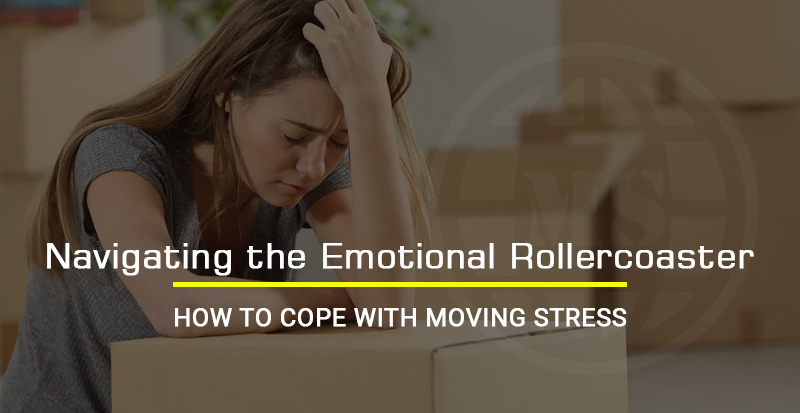Moving can be stressful. However, you can cope with moving stress by some tips given in this post. Hiring packers and movers will also reduce the moving stress. Get free quotes for the best packers and movers in your area here.
Don’t Wait, Get Free Quotes!
Moving to a new home can be an exciting adventure filled with new possibilities. It offers the opportunity for a clean slate. It should serve as a fresh beginning. Also, it grants you the chance to leave behind all the stressful incidents that have weighed you down.
But it can also be emotionally challenging and stressful. The process of uprooting your life, saying goodbye to familiar places and faces, and adapting to a new environment can trigger a rollercoaster of emotions.
However, with the right strategies and mindset, you can navigate this emotional rollercoaster. You can find ways to cope with the stress of moving. In this article, you will learn some effective coping tips to manage moving stress. These mechanisms will help you manage your emotions during this significant life transition.
Top Reasons for Emotional Stress of Moving
Is the emotional stress of moving normal? What are the reasons behind the stress that accompanies moving out of your home? Just the act of moving does not necessarily trigger feelings of anxiety. There can be several associated reasons that can trigger the emotional stress of moving. Here are some factors that usually make moving out emotionally stressful.
- Leaving Familiarity Behind: Saying goodbye to familiar places, such as your neighbourhood or childhood home, can lead to feelings of nostalgia and loss.
- Saying Goodbye to Loved Ones: Leaving friends and family behind can cause loneliness, separation anxiety, and the fear of missing out on important moments in their lives.
- Fear of the Unknown: The uncertainty of a new environment, neighbourhood, and routines can induce anxiety and fear of the unknown.
- Disruption of Routines and Comfort Zones: Breaking established habits and adjusting to a new living environment can lead to feelings of instability, stress, and a loss of familiarity and control.
- Financial Concerns: The cost of relocating, finding a new home, and potential changes in income can be a significant source of stress.
- Overwhelm from Organisational Tasks: Packing, organising, and coordinating the logistics of a move can be overwhelming, leading to stress and feeling overwhelmed.
- Adjusting to a New Community: Building a sense of belonging in a new community takes time and effort, which can create feelings of isolation and social anxiety.
- Disruptions in Daily Life: Moving disrupts the normal flow of daily life, which can add to the stress of adjusting to a new living situation.
- Emotional Attachment to the Previous Home: Letting go of an emotionally significant home can evoke feelings of nostalgia, sadness, and a sense of loss.
- Cultural and Environmental Shifts: Adapting to new customs, languages, climates, and lifestyles can be emotionally challenging, especially if the new environment feels drastically different.
Understanding these reasons can help you recognise and address your emotions proactively. Further, this will ease the transition process and promote emotional well-being.
Symptoms of Moving Stress
Moving stress can manifest in various ways. Here are some common symptoms to be aware of:
- Anxiety and Worry: Feeling restless, apprehensive, or having excessive worry about the moving process. Overthinking about a new environment or the uncertainties that come with the change.
- Mood Swings: Irritability, frustration, sadness, excitement, and feeling overwhelmed.
- Sleep Disturbances: Restless nights due to racing thoughts, move-related preoccupation, or general unease.
- Low Energy: Feeling drained and having low energy due to move-related demands and stress.
- Loss of Appetite or Overeating: Altered eating patterns, loss of appetite, overeating, or emotional eating.
- Difficulty Concentrating: Difficulty focusing, making decisions, or completing tasks due to move-related distractions.
- Nostalgia and Grief: Experiencing a sense of loss, longing, or sadness for the familiarity and memories associated with the previous home or community.
Please note: Symptoms of moving stress may vary from person to person. If you are experiencing persistent or severe symptoms, seek support from loved ones. Or, consider consulting a psychiatrist for help to manage moving-related stress.
How to Cope with Moving Stress Effectively
Discover effective strategies to cope with moving stress and the challenges that arise in the shifting process. These practical techniques and expert tips will ensure a smoother transition.
1. Acknowledge and Validate Your Emotions
Moving can stir up a wide range of emotions, including sadness, anxiety, fear, and even excitement. It's important to acknowledge and validate these emotions rather than suppress or ignore them. Give yourself permission to feel and express whatever comes up. By acknowledging your emotions, you can begin to understand and address them more effectively.
2. Create a Support System
Building a support system during the moving process is crucial for managing emotional stress. Reach out to friends, family, or even online communities that have gone through similar experiences. Share your feelings, seek advice, and gain perspective from those who have been in your shoes. Having a support system can provide comfort, reassurance, and a sense of belonging during this transitional period.
3. Plan and Organise
A well-structured moving plan can alleviate some of the stress associated with the process. Break down the tasks into manageable steps and create a timeline to guide you through the transition. By organising your move, you can regain a sense of control and reduce anxiety about the unknown. Remember to celebrate each milestone achieved along the way to boost your morale and stay motivated.
4. Practise Self-Care
Moving can consume a significant amount of physical and emotional energy. It's crucial to prioritise self-care during this time. Set aside time for activities that help you relax and recharge. Whether it's taking a walk in nature, practising mindfulness and meditation, or engaging in hobbies you enjoy, these self-care practices can help alleviate stress and promote emotional well-being.
5. Stay Positive and Embrace Change
Maintaining a positive mindset can make a world of difference when dealing with moving stress. Instead of focusing on what you're leaving behind, try to embrace the opportunities that lie ahead. Approach the move as a chance for personal growth, new experiences, and building new connections. By shifting your perspective, you can turn the moving process into a transformative journey.
6. Give Yourself Time to Adjust
Moving to a new place often comes with a period of adjustment. Understand that it's normal to feel unsettled or out of place initially. Give yourself permission to take the time you need to adapt to your new surroundings. Be patient with yourself and allow the transition to unfold naturally. With time, you will start to build a sense of familiarity and find your place in your new community.
Conclusion
Moving can be an emotionally challenging experience, but by implementing these coping strategies, you can navigate the emotional rollercoaster with greater resilience. Remember to acknowledge and validate your emotions, create a support system, plan and organise, practise self-care, stay positive, and give yourself time to adjust. Moving is an opportunity for personal growth and new beginnings. By taking care of your emotional well-being, you can turn the moving process into a positive and transformative chapter in your life.
You can count on Moving Solutions to hire packers and movers in your area. Hiring professional services can help you minimise the moving stress.
A copywriter, blogger, content strategist by profession, and an information junkie by heart. I have a penchant for reading, researching, writing, and anything related to creating persuasive content. For me, writing is something that ignites my creativity and helps in keeping me on cloud nine. I have been working in the content writing domain since 2006. Be it blogging or copywriting, I create better content that fuels conversations and skyrockets search traffic.






